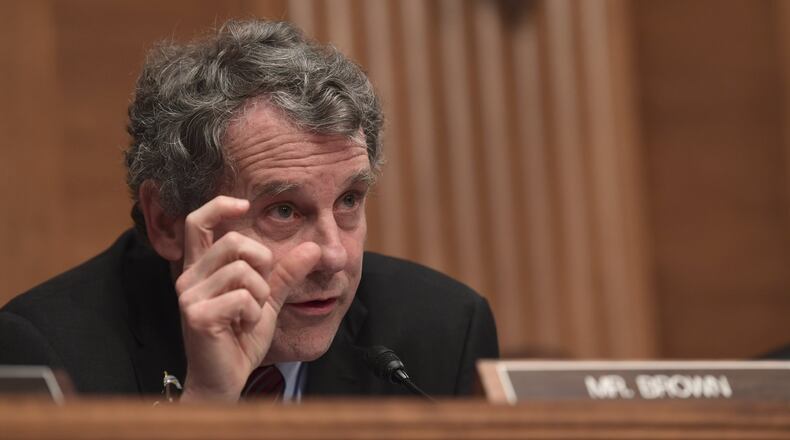Until the trade war erupted between the world’s two largest economies, American farmers exported $14.5 billion worth of soybeans to China in 2017, which was more than 61 percent of all U.S. soybean exports.
Since last summer, China dramatically scaled back its purchase of American soybeans. Combined with farmers growing huge amounts of soybeans, the price of a bushel of Iowa soybeans has fallen nearly 20 percent.
The slump in exports of soybeans and pork products could emerge as a major issue next January when Iowa holds its caucuses, the first major presidential contest in the 2020 elections.
A survey of rural bankers this month by Creighton University in Nebraska shows that more than half of banks in the 10 farm states have “boosted collateral requirements for farm loans” because of weaker farm income.
“Iowa grows more soybeans than any other state,” said David Swenson, a professor of economics at Iowa State University. “At least on agricultural commodities, we seem to be getting hit the worst.”
“I don’t know how Sherrod sells this message when he comes to Iowa,” Swenson said.
Yet others suggest the drop in soybean exports may be dwarfed by other issues. Because the Trump administration paid farmers $12 billion to compensate them for losses, farmers are more nervous than angry.
“Farmers understand there is a problem and (yet) a lot of them have stuck with the president,” said David Yepsen, former political editor of the Des Moines Register who covered the Iowa Caucuses for years. “It’s kind of a mixed thing Brown is walking into.”
“His trade position will be popular with labor and that’s an important constituency in the Democratic Party caucuses,” Yepsen said. “Inside the caucuses he’s going to find a receptive audience.”
And Brown has made a career of winning blue-collar voters with his opposition to a myriad of free-trade agreements. In particular, he has argued that Chinese manufacturers have taken advantage of mild U.S. trade restrictions to flood the American market with low-cost products.
In addition, advocates of a tougher China trade policy contend that China requires American firms to turn over what is known as intellectual property rights, such as inventions.
In an interview, Brown insisted that “China cheats and hurts American workers and farmers when they cheat. I supported tariffs, but” Trump “has not done this right. He has not worked with our allies. If you do this with your allies, China knows you mean business right away and you get them to the table faster.”
“Farmers generally don’t like tariffs,” Brown said. “But farmers understand if you use them effectively and cleanly as (temporary) enforcement, you have a different outcome.”
Last summer, the Trump administration imposed steep tariffs on a broad array of imports from China, which led to China retaliating with hefty tariffs on U.S. exports of soybeans and pork.
China not only scaled back their purchases of American soybeans, but even more alarming, the Chinese sought soybeans from other markets, such as Brazil.
“The history is once you get the scarlet letter of being an unreliable supplier, then clearly China is going to diversify its imports,” said Scott Irwin, a professor of agricultural economics at the University of Illinois. “The real concern is this … spurs investment in soybean production in other areas that would not have been spurred without this trade war.”
Lindsay Greiner, president of the Iowa Soybean Association and who farms 400 acres of soybeans just south of Iowa City, said many farmers back a tougher trade stance with China, although some are suggesting “maybe we have been the sacrificial lamb.”
“Brazil can supply China with a lot of their soybeans and they can add acreage,” Greiner said. “If that happened, that would leave Iowa soybean farmers out in the cold.”
A study released last fall by Iowa State University predicted the drop in soybean and pork exports could cost Iowa farmers as much as $1.5 billion anually, a staggering loss to state farmers who just a few years ago enjoyed high prices and brisk foreign markets for their commodities.
“Agriculture depends very heavily on exports,” said Ernie Goss, an economist at Creighton University. “We produce more food than we ever consume.”
Brown acknowledged he likely would be asked about soybean prices during question-and-answer sessions he will conduct across Iowa. But he said the “farmers are really hurt by this administration and they didn’t have to be if Trump had done this right.”
Yet some analysts contend that Iowa Democrats may focus less on international trade and more on selecting a candidate they believe can defeat Trump. Even though Trump carried Iowa by 10 percentage points in 2016 against Democratic nominee Hillary Clinton, Iowa Democrats are hopeful they can erase that outcome with the right candidate.
“Above all, it is electability,” Yepsen said. “Democrats are agreed on one thing: They want to beat the SOB. There is vicious opposition to Trump among caucus-going Democrats.”
“Caucus goers would be willing to set aside some litmus tests that might have been administered in the past if they thought the guy was the best at putting together 270 electoral votes,” Yepsen said.
About the Author
